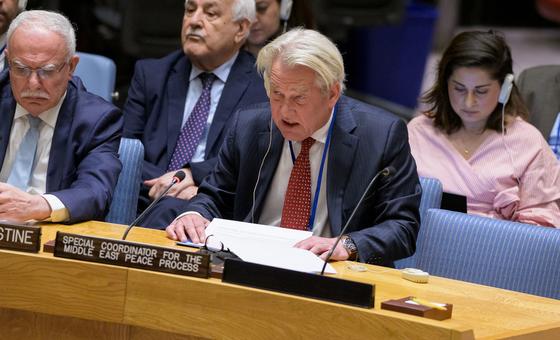UN Middle East envoy Tor Wennesland on Wednesday called for an inquiry into the strike against a Gaza hospital that killed hundreds, including patients, staff and displaced people seeking shelter.
Mr. Wennesland told the Security Council that he “watched in horror and in real time” as reports of mass casualties emerged from Al-Ahli Hospital in Gaza City on Tuesday.
“The circumstances of this catastrophe and responsibility remains and still needs to be clarified. And we will need a fact-based, full investigation and broad investigation,” he said, speaking from Doha.
Brink of an abyss
Mr. Wennesland, officially UN Special Coordinator for the Middle East Peace Process, updated the Council on his efforts to end the current hostilities, which he called one of the most difficult moments facing Israelis and Palestinians in 75 years.
He unequivocally condemned the Hamas militant group’s deadly attacks on Israel on 7 October, and seizing of hostages, saying there is no justification for these acts.
“I fear that we are at the brink of a deep and dangerous abyss that could change the trajectory of the Israeli-Palestinian conflict, if not of the Middle East as a whole,” he warned.
After more than a century of conflict and over half-a-century of occupation, the international community had failed to bring to bring the parties to a just, sustainable political resolution, he said. The recent events have served to re-ignite grievances and re-animate alliances across the region.
“The risk of an expansion of this conflict is real – very, very real – and extremely dangerous,” he said.

Tor Wennesland (centre), UN Special Coordinator for the Middle East, and Philippe Lazzarini, head of the UN relief agency for Palestine refugees (UNRWA), meet with Foreign Minister Sameh Hassan Shoukry Selim (right) of Egypt to discuss the Israel-Palestine crisis.
Diplomatic efforts
Mr. Wennesland has been working to avert this threat. He and the UN Secretary-General have been in constant communication with both the parties and regional and international actors “who have agency and influence”.
For example, meetings and ongoing discussions with leaders in Egypt have focused both on facilitating access for humanitarian aid into Gaza through the Rafah Crossing, the sole one into the enclave, and “our shared concerns and efforts to rein in further regional hostilities.”
The envoy will return to Cairo on Thursday to join the Secretary-General in continuing these discussions, and he also welcomed the Egyptian President’s swift convening of a summit of world leaders to discuss the crisis.
Eye on the prize
“With the parties on the ground in Jerusalem, Tel Aviv and Ramallah, my message has remained steadfast, that we must not let the dynamic of the current conflict take our eyes off what I will call the day after,” he continued. “The day after, we need to start working on now.”
Mr. Wennesland stressed the need for time and space to achieve two urgent objectives, namely Hamas’s immediate, unconditional release of all hostages, and unrestricted access of humanitarian aid into Gaza.
He further appealed for collective efforts to end the hostilities and prevent any further expansion of the conflict to the region. “Regarding West Bank and Lebanon, there should be no miscalculation, no provocation and no step that closes the door to our current efforts,” he said.
The envoy also underlined the ultimate need to work towards a long-term political solution, in line with UN resolutions, international law and previous agreements.

